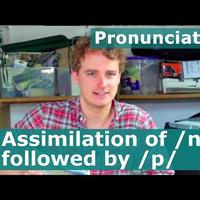13- Assimilation of /n/ followed by /p/
Hi, I'm Tim and this is my pronunciation workshop. Here, I'm gonna show you how English is really
spoken. It'll help you become a better listener and a more fluent speaker. Come on, let's go inside.
Now, one of the things that happens when we speak fluently is that the sounds
at the end of a word can change. To demonstrate this, we asked people on the streets of London
to identify this Tube station.
Green Park Green Park
Green Park It's Green Park
Now, the word Green ends in the sound /n/, doesn't it? Or does it? Listen again, what
sound can you hear?
Green Park Green Park
Green Park It's Green Park
So, what's happening here? Well, when one word ends in the sound /n/ and the next word
begins with a /p/, /b/, /w/ or /m/ sound, then the /n/ from the end of the word changes
to an /m/ sound as your mouth gets ready to pronounce the next sound. 'Green Park' becomes
'Greempark'. Watch again - this time in slow motion. Look at the mouth shape. Can you see
/n/, or /m/?
Green Park
Green Park
Green Park
It's Green Park
Interesting, eh? This is called assimilation. Here are some more examples:
I own ten pairs of socks. He didn't do it on purpose.
I would love to live in Paris. Can you come on Wednesday?
Right, so you've heard the examples and now it's your turn. Are you ready? Listen and repeat.
I own ten pairs of socks.
He didn't do it on purpose.
I would love to live in Paris.
Can you come on Wednesday?
Well done. Now if you want to read more about pronunciation please visit our website: bbclearningenglish.com.
And that's about it from the pronunciation workshop for now. I'll see you next time. Bye bye.
Now, where is Green Park - is it on Buckingham Palace Road? Aaaah!

